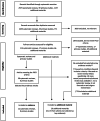Reducing stigma and discrimination associated with COVID-19: early stage pandemic rapid review and practical recommendations
- PMID: 33504412
- PMCID: PMC7884669
- DOI: 10.1017/S2045796021000056
Reducing stigma and discrimination associated with COVID-19: early stage pandemic rapid review and practical recommendations
Abstract
Aims: To develop recommendations for strategies and interventions to reduce stigma and discrimination related to coronavirus disease 2019 (COVID-19), through reviewing and synthesising evidence in relation to COVID-19 and other disease outbreaks and infectious/stigmatised conditions from systematic reviews and primary studies and recommendations from additional materials.
Methods: Rapid review, drawing on the World Health Organization's (WHO) methodology for developing interim guidelines during health emergencies. PubMed/MEDLINE, PsycINFO, Cochrane Central and Campbell Collaboration searched up to mid-April 2020. Searches were supplemented by reference-searching and expert recommendations. Searches were designed to identify: (1) systematic reviews (<10 years), or (2) primary intervention studies (no date limit) reporting evidence on anti-stigma interventions (in relation to COVID-19 or other infectious/stigmatised conditions) or (3) additional relevant materials. Data were extracted on population, intervention, outcome and results. These data were compiled into evidence summary tables and narrative overviews. Recommendations on strategies for COVID-19 stigma-reduction were developed using the WHO 'Evidence to Decision' framework approach. The review protocol was registered with PROSPERO (registration ID: CRD42020177677).
Results: The searches identified a total of 4150 potentially relevant records, from which 12 systematic reviews and 29 additional articles were included. Overarching considerations and specific recommendations focus on: (1) language/words used in relation to COVID-19 and affected people; (2) media/journalistic practices; (3) public health interventions; (4) targeted public health interventions for key groups and (5) involving communities and key stakeholders.
Conclusions: These recommendations represent the first consolidated evidence-based guidance on stigma and discrimination reduction in relation to COVID-19. Mitigating the impact of stigma is critical in reducing distress and negative experiences, and strengthening communities' resolve to work together during exceptional circumstances. Ultimately, reducing stigma helps addressing structural inequalities that drive marginalisation and exacerbate both health risks and the impact of stigma. Administrations and decision makers are urged to consider integrating these recommendations into the ongoing COVID-19 response.
Keywords: Coronavirus; emergency response; health inequalities; public health.
Conflict of interest statement
None reported by any of the contributing authors.
Figures
References
-
- Alonso-Coello P, Schünemann HJ, Moberg J, Brignardello-Petersen R, Akl EA, Davoli M, Treweek S, Mustafa RA, Rada G, Rosenbaum S, Morelli A and Guyatt GH and GRADE Working Group (2016) GRADE Evidence to Decision (EtD) frameworks: a systematic and transparent approach to making well informed healthcare choices. 1: Introduction. BMJ 353, i2089. doi: 10.1136/bmj.i2016 - DOI - PubMed
-
- American Psychological Association (2020) Combating bias and stigma related to COVID-19. Retrieved 10 April 2020, from https://www.apa.org/topics/covid-19-bias
-
- Barrett R and Brown PJ (2008) Stigma in the time of influenza: social and institutional responses to pandemic emergencies. The Journal of Infectious Diseases 197, S34–SS7. - PubMed
Publication types
MeSH terms
Grants and funding
LinkOut - more resources
Full Text Sources
Other Literature Sources
Medical
Miscellaneous


